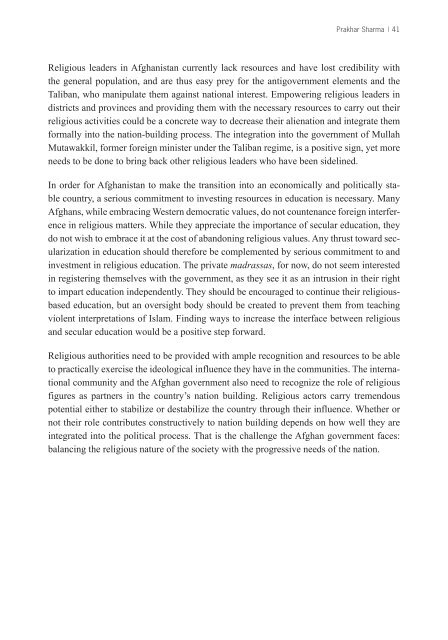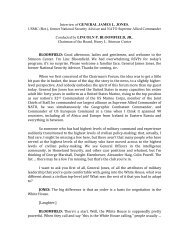Islam and Politics - The Stimson Center
Islam and Politics - The Stimson Center
Islam and Politics - The Stimson Center
You also want an ePaper? Increase the reach of your titles
YUMPU automatically turns print PDFs into web optimized ePapers that Google loves.
Prakhar Sharma | 41<br />
Religious leaders in Afghanistan currently lack resources <strong>and</strong> have lost credibility with<br />
the general population, <strong>and</strong> are thus easy prey for the antigovernment elements <strong>and</strong> the<br />
Taliban, who manipulate them against national interest. Empowering religious leaders in<br />
districts <strong>and</strong> provinces <strong>and</strong> providing them with the necessary resources to carry out their<br />
religious activities could be a concrete way to decrease their alienation <strong>and</strong> integrate them<br />
formally into the nation-building process. <strong>The</strong> integration into the government of Mullah<br />
Mutawakkil, former foreign minister under the Taliban regime, is a positive sign, yet more<br />
needs to be done to bring back other religious leaders who have been sidelined.<br />
In order for Afghanistan to make the transition into an economically <strong>and</strong> politically stable<br />
country, a serious commitment to investing resources in education is necessary. Many<br />
Afghans, while embracing Western democratic values, do not countenance foreign interference<br />
in religious matters. While they appreciate the importance of secular education, they<br />
do not wish to embrace it at the cost of ab<strong>and</strong>oning religious values. Any thrust toward secularization<br />
in education should therefore be complemented by serious commitment to <strong>and</strong><br />
investment in religious education. <strong>The</strong> private madrassas, for now, do not seem interested<br />
in registering themselves with the government, as they see it as an intrusion in their right<br />
to impart education independently. <strong>The</strong>y should be encouraged to continue their religiousbased<br />
education, but an oversight body should be created to prevent them from teaching<br />
violent interpretations of <strong>Islam</strong>. Finding ways to increase the interface between religious<br />
<strong>and</strong> secular education would be a positive step forward.<br />
Religious authorities need to be provided with ample recognition <strong>and</strong> resources to be able<br />
to practically exercise the ideological influence they have in the communities. <strong>The</strong> international<br />
community <strong>and</strong> the Afghan government also need to recognize the role of religious<br />
figures as partners in the country’s nation building. Religious actors carry tremendous<br />
potential either to stabilize or destabilize the country through their influence. Whether or<br />
not their role contributes constructively to nation building depends on how well they are<br />
integrated into the political process. That is the challenge the Afghan government faces:<br />
balancing the religious nature of the society with the progressive needs of the nation.

















